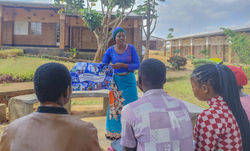

PROJECT TITLE:
Integrating Aquaculture Agriculture to Combat Food Insecurity in Malawi (Focus Area: Gender Transformation)
IMPACT AREAS:
Zomba, Thyolo, Dowa and Mzimba Districts
PROJECT PERIOD: 2025 - 2026
WOLREC is implementing a gender transformative intervention within the “Integrated Aquaculture Agriculture to Combat Food Insecurity in Malawi” (IAAM) project led and funded by CDF Canada. WOLREC is using the SASA! Together approach, an evidence-based methodology designed to address power imbalances and harmful social norms that perpetuate women’s vulnerability.
The approach is being applied in four impact districts (Mzimba, Dowa, Zomba and Thyolo) across 40 communities altogether where WOLREC is engaging Community Activists, Traditional Leaders and key institutional allies such as the Police Victim Support Unit, Health Surveillance Assistants and Child Protection Workers.
The activities being implemented are following the four SASA! Phases which include Start, Awareness, Support, and Action to promote reflection and collective action on power dynamics and intimate partner violence.
A total of 80 Community Activists (50% women) have been trained and are being supported to lead participatory activities within their villages. 62 Traditional Leaders and 92 institutional representatives per district have been engaged to promote equitable gender relations and strengthen gender-responsive service delivery.
Through the implementation of the SASA! Together approach WOLREC aims to challenge unequal power relations, transform negative gender norms and promote equitable participation of women, men, girls and boys in decision-making processes.
The interventions will not only strengthen community structures that support gender equality but also foster sustainable social change by encouraging collective responsibility, accountability and collaboration among community members and local institutions.
Project Objectives
-
To promote gender equality and transform power relations within IAAM project communities by addressing harmful social norms and practices that perpetuate women’s vulnerability and limit their participation in decision-making.
-
To strengthen community structures and institutions to become more gender-responsive and supportive of women, men, girls and boys in addressing issues related to power imbalance and gender-based violence.
-
To enhance the meaningful participation of women and men in household and community decision-making, wealth creation and poverty reduction.
Expected Outcomes
-
Increased meaningful participation of women, men, girls and boys in decision-making, wealth creation and poverty reduction.
-
Increased participation of women in decision-making positions at household and community levels.
-
Improved gender relations within households and communities, supporting equitable access to power, agency and resources.
 |  |
|---|---|
 |  |
 |  |
 |